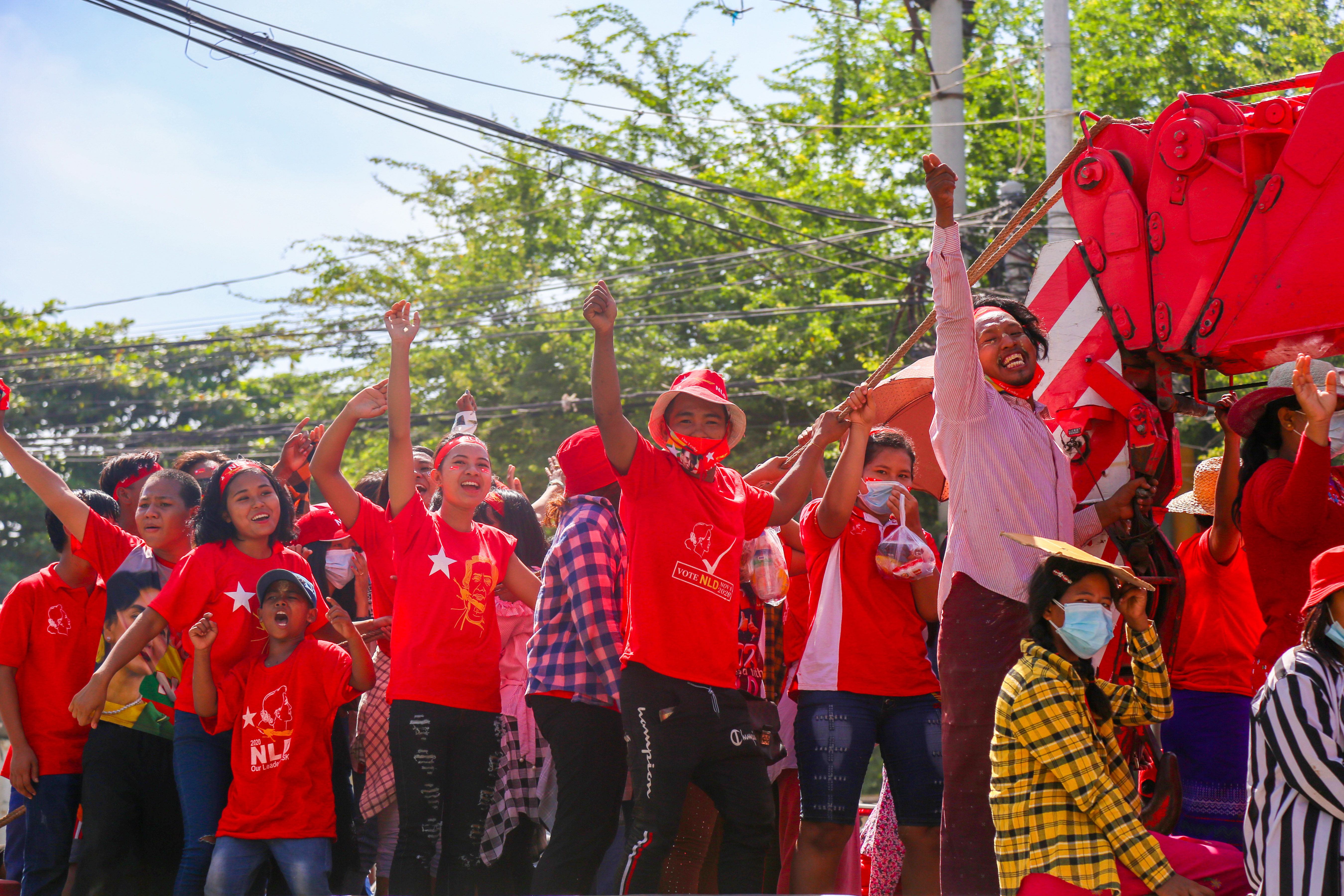Parliamentary Elections in Myanmar: A Challenge for EU Policy

These will be the second partially free elections since the country entered the path of democratic reform in 2011 (the first were in 2015). Almost 38 million eligible voters will elect representatives to two chambers of parliament (75% of the seats) and seven regional and seven state parliaments. More than 7,000 candidates from 93 political parties are running for a total of 1,971 seats. The ruling NLD under the Aung San Suu Kyi’s leadership, acting as the de facto head of government, remains the clear favourite. The vote will take place amidst the COVID-19 pandemic. While there were few reported infections for a long time (in total, less than a thousand as of the end of August), the number of cases has been growing rapidly since September (to more than 32,000 as of 15 October).
NLD’s Mixed Record
The party’s decisive victory in 2015 when it won almost 80% of the contested parliamentary seats awakened the public’s hope for peace, a stronger democracy, and economic development. Limited progress in these areas may mean a decline in support for the ruling party, especially among ethnic minorities. Liberalisation of the economy, opening to foreign investment, and integration into regional and global supply chains initially made Myanmar one of the fastest-developing countries in the region (on average, above 6.1% since 2011). The number of people living below the national poverty line fell from 42% in 2010 to 24% in 2017. However, even before the outbreak of the pandemic, economic growth had slowed from 6.7% in 2018 to 2.9% in 2019. According to World Bank estimates from June, GDP growth in 2020 will be between 0.5% and -2.5%. Infrastructure development, job creation, and the improvement of education quality will remain the main challenges for the new government.
While Aung San Suu Kyi made ending the 60-year civil war with ethnic minorities her government’s primary goal in 2016, the peace process has had only a modest impact. To date, five of the 15 major armed ethnic groups have not signed the ceasefire agreement and have not joined the negotiations. The main result of the recent, fourth peace conference—the so-called Panglong 21 in August—was a commitment to return to the talks after the elections. In recent months, fighting has intensified especially in the Shan and Kachin states and in Rakhine where the uprising of the local Buddhist minority is intensifying. A brutal military offensive in that state in 2017 against Rohingya Muslims resulted in the expulsion of more than 700,000 people from the country and international criticism of Aung San Suu Kyi. She was silent on this issue and defended the military’s actions before the tribunal at The Hague in December 2019 presumably to win the support of ethnic Bamars, who are the majority of the population (68%). As she disappointed many ethnic parties, they did not form a joint bloc with the NLD in the upcoming elections.
The deteriorating relations with minorities, the restriction of freedom of speech, and the arrest of critics of the authorities also indicate that democratisation has stalled. It has not been possible to introduce reforms in the political system, hindered by the constitution adopted in 2008 by the military junta that has been ruling since 1962. The constitution gives the army three key ministries, 25% of seats in parliament, and prevents Aung San Suu Kyi from taking office as president. NLD’s attempts at reform—it proposed 114 amendments to the constitution in March 2020—have been blocked by the military. As a result, a hybrid system has emerged in which the NLD takes care of the administration and the army makes the most important decisions.
Foreign Policy in China’s Shadow
Over the past five years, Myanmar’s relations with the EU and the U.S. have drastically deteriorated while its partnership with China has tightened. After Myanmar’s initial opening to the world, the country’s subsequent international condemnation in 2017 made China once again the most important economic and political ally, guaranteeing protection against international sanctions. In December 2018, Myanmar signed an agreement on a 1,700 km-long economic corridor (CMEC) from the Chinese Yunnan province to the Bay of Bengal, a project important to China. During the first visit of President Xi Jinping to Myanmar in January, 33 agreements were signed, including on key investments within the CMEC—the construction of a seaport and a special economic zone (SEZ) in Kyaukphyu, a new city in Yangoon, and an SEZ in Ruila on the common border. The ties between the two countries were further strengthened during the pandemic as China sent medical equipment and medicine to Myanmar, and promised to provide vaccines free of charge.
At the same time, the authorities must weigh the risk of over-dependence on Chinese loans, as well as the growing resistance of the local population and ethnic groups to certain investments (for example, the construction of the Myitsone hydroelectric power plant, suspended since 2011). China’s influence is somehow balanced by maintaining Myanmar’s cooperation with Japan, India, and ASEAN countries.
Worsening Relations with the EU
In its relations with Myanmar, the Union counts on the democratisation of the country and the opening of trade and investment opportunities. It used the beginning of reforms in 2011 to end the country’s isolation and support the systemic transformation, economic development, and the peace process. In 2013, it lifted most of the sanctions (except for the arms embargo), opened the EU Delegation in Yangoon, and granted trade preferences (“everything but arms”, EBA) allowing duty-free exports of products to the EU market. As a result, Myanmar’s recorded exports to the EU surged from €573 million in 2015 to €2.8 billion in 2019. Thus, the EU became Myanmar’s third-largest trading partner, accounting for 11% of its exchange, behind China (33%) and Thailand (15.4%). It is also the fifth-largest investor and one of the main donors of development aid.
However, the halt to the peace process, human-rights violations, and the persecution of the Rohingya, especially in 2017, undermined confidence in Aung San Suu Kyi in Europe, which froze cooperation. In 2017, negotiations on an investment protection agreement, ongoing since 2014, were discontinued, and in June 2018, the EU introduced sanctions against military officials accused of crimes against the Rohingya (extended in 2019 and in 2020). In September, the European Parliament suspended Aung San Suu Kyi from the Sakharov Prize Community, and the European Commission is threatening to deprive Myanmar of the EBA if it fails to account for those responsible for the crimes against the Rohingya and does not allow the safe return of refugees.
Prospects and Conclusions: the EU’s Dilemma
NLD is likely to win the elections, though not as decisively as five years earlier. It is possible that ethnic parties and the USDP military party will increase their representation in parliament. However, this should not prevent the NLD from electing a president and forming a new government. Weaker legitimacy and tense relations with Western countries will limit the possibility of carrying out further political reforms (e.g., changes to the constitution) and ending the ethnic conflicts. As a result, the dichotomy of power will continue, with the army in a strong position and China’s influence growing.
This creates a dilemma for the EU of whether to pursue a policy focused on the protection of human rights or to adopt a more pragmatic approach. Such normalisation of relations with the new government would run the risk of recognising that the EU has abandoned its policy to protect the persecuted Rohingya. On the other hand, further increasing pressure (e.g., suspending the EBA) will reduce the EU’s ability to exert pressure, affect ordinary citizens, and make Myanmar even more dependent on China. This would lead to a return to the pre-2011 situation when the role of the EU in Myanmar was minimal.
Therefore, the EU may consider using the elections to restart relations and introduce a two-pronged policy. This would mean, on the one hand, maintaining targeted sanctions against the security apparatus, and, on the other hand, resuming the political dialogue with the civilian authorities in search of ways to resolve disputes. In the absence of a better alternative, supporting Aung San Suu Kyi over the army offers the only chance to continue some democratic reforms and the peace process. The EU may also undertake closer cooperation with partners from Asia (India, Japan, Korea, ASEAN) to balance China’s influence and work out a solution to the problem of the Rohingya minority.


